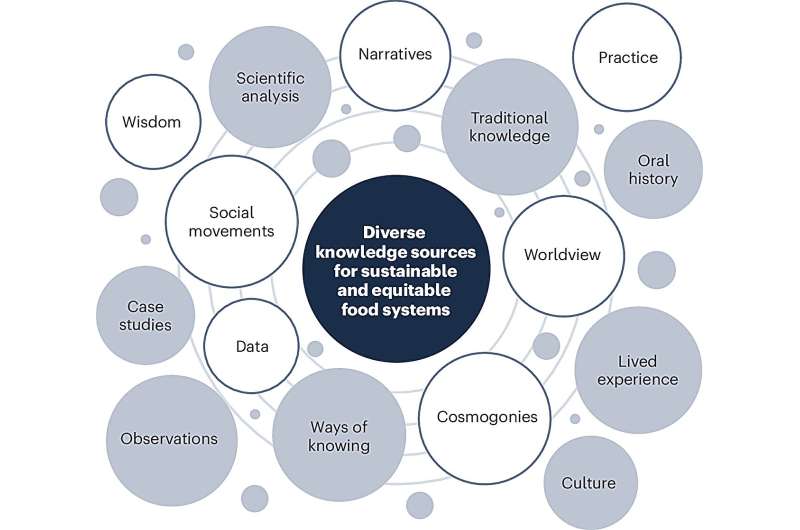This article has been reviewed according to Science X's editorial process and policies. Editors have highlighted the following attributes while ensuring the content's credibility:
fact-checked
peer-reviewed publication
trusted source
proofread
There is an urgent need for democratizing knowledge to revolutionize global food systems, researchers argue

In an article published today in Nature Food, a team of international experts delves into the urgent need for democratizing knowledge to revolutionize global food systems. Titled "Knowledge Democratization Approaches for Food Systems Transformation," the article emphasizes the necessity of incorporating traditional, Indigenous, and place-based knowledges into decision-making processes to address blind spots in current food system policies and actions.
A consortium of experts from diverse backgrounds, including V. Ernesto Méndez and Colin R. Anderson, professors at the University of Vermont and co-directors of the UVM Institute for Agroecology (IfA), shed light on the critical role of democratizing knowledge in transforming global food systems.
Méndez emphasizes the human significance of this research. "Until now we have privileged Western scientific knowledge, and this article urgently calls for us to include different types of knowledge and to recognize the people who have developed it."
The article advocates for a shift towards participatory and transdisciplinary approaches that integrate a wide array of knowledge systems, including those of Indigenous, scientific, and traditional understandings. By embracing this diversity of practices, researchers can generate contextually relevant solutions and foster more inclusive and equitable food systems. The authors also suggest that this is of primary importance when developing policy that impacts food systems.
Led by Samara Brock from Yale University, the article is an outcome of an international process convened by the Global Alliance for the Future of Food on the Politics of Knowledge that brought together food systems leaders to strategize on advancing research and evidence for agroecology. Drawing from case studies worldwide, the authors highlight innovative approaches that involve local actors in knowledge production and exchange.
Examples include farmer-managed natural regeneration in sub-Saharan Africa, the 1,000 Farms initiative in the U.S., and the Hua Parakore system in Aotearoa New Zealand. The researchers also provide examples of policy groups who are using this co-creator model to improve outcomes and increase adoption of innovative approaches.
Despite the breadth of disciplines of the authors, Méndez points to the cohesive perspective of the paper's contributors. "It is key to note the diversity of sectors represented in the authorship—we have scientists, practitioners, staff from non-profit organizations and philanthropists—all making an urgent call for us to democratize our knowledge base as the foundation to attain an equitable and sustainable food systems transformation," he explains.
The principles outlined in the article emphasize the importance of epistemic justice, intercultural co-creation, and knowledge mutualism and exchange in democratizing knowledge-policy processes. These principles, the authors argue, are essential for addressing biases and empowering marginalized communities in shaping food system transformations.
More information: Samara Brock et al, Knowledge democratization approaches for food systems transformation, Nature Food (2024). DOI: 10.1038/s43016-024-00966-3
Journal information: Nature Food
Provided by University of Vermont





















